|
‘National Hospital, the most complete hospital’ :
Mahinda Chinthana has ensured free healthcare
Aravinda HETTIARACHCHI
Dr. Hector Weerasinghe (MD.MSc.FCMA),
former Director in charge of the Colombo National Hospital was a well
known administrator who supervised all areas in the hospital. The Daily
News met him to sketch a basic picture of the National Hospital’s health
services
Colombo National Hospital when compared to other hospitals, is the
largest teaching hospital in this country with a long reputed history.
This hospital today has 3,300 beds with 7,000 people working. It has the
most experienced consultants who visit this hospital after serving in
various parts of this island. Thus, they have a wealth of experience in
addition to their educational qualifications.
|

Dr Hector Weerasinghe. Picture by Saman Mendis |
The hospital has the latest equipment in radiology and able to take
MRI scans, CT scans and Ultra Sound tests with various kinds of
sophisticated equipment. It also conducts lab tests and has operative
theatres with the latest equipment for tests and surgery. “We plan to
develop this hospital expanding it to various other specialized areas of
medicine,” Dr. Weerasinghe said.
Trauma victims
Already, a separate section for neurosurgery named the Neuro Trauma
Centre was opened recently by President Mahinda Rajapaksa. This was
completed with the assistance of the Kingdom of Saudi Arabia at a cost
of Rs. 3,000 million. The hospital, therefore, has the world’s latest
neurosurgery equipment today. Also it has well-trained professionals,
such as, doctors, nurses and attendants.
The new Accident Service section is constructed with the latest
equipment to treat trauma victims. When analyzing the causes for
hospitalization, the main cause is trauma injuries that occur due to
accidents, including traffic accidents, Dr Weerasinghe pointed out. “Our
trauma centre which has the best facilities in this island, has the
capacity and capability of providing treatment to all kinds of trauma
victims. Our Accident Service consultants are working 24 hours a day.
They are not available on call but are physically present in this
accident service section 24 hours a day and 365 days of the year,” he
said.
The hospital recently performed the first-ever liver transplant in
the country. “If you sent this patient abroad, to India or Singapore,
this patient will have to spend about Rs. 7 or 8 million for the
operation. During this year, we have performed two or three liver
transplants successfully,” Dr. Weerasinghe pointed out.
“Once a patient came to this hospital with his hand cut and totally
separated from his body. With all our modern techniques and expert
plastic and constructive surgery consultants we completely fixed this
hand through a14 hour operation.
Healthcare services
|

Colombo National Hospital. File photo |
“Before 1977, if someone wanted to do a bypass surgery they had to go
either to India or Europe. Now everything is available in this hospital.
We carry out about 1,000 open-heart surgeries a year. About ten years
ago, we did only about 300 such surgeries a year. Sri Lankan hospitals
have almost all facilities now. The quality of the health service has
rapidly improved after 1977,” Dr. Weerasinghe said.
The hospital is responsible for about two million patients from
various outstation departments (hospitals) in this country. Nearly
250,000 patients are admitted per year. In addition, it conducts 70,000
to 80,000 various kinds of complicated operations, 60,000 CT scans,
7,000 MRI scans and three or four million lab tests for a year.
Dr. Weerasinghe said that hospitals today are in good condition, even
in the rural parts of the country. Those who can afford have the
opportunity to receive healthcare services in the private sector. The
private sector has not affected badly the state health service at all,
he said.
“Our target is to make all things available at all times. There are
ups and downs. Yet today, the health sector has advanced technology,
such as echo-cardiology, cardiograms and angiography using sophisticated
equipment. We also use even more technologically sophisticated
techniques, such as, individual cardiology with the use of computers,”
Dr Weerasinghe said.
He said the government most of the time does all these services free
of charge, though some people do not know it. Sometimes the government
spends about Rs. 400,000 to 700,000 per patient. At times even up to Rs.
one million. “Whenever a paracetamol or some little thing is short,
people talk more about it. Yet they do not see the other facilities,” he
said.
Dr. Weerasinghe said that if a patient undergoes treatments in an
Intensive Care Unit of a private hospital, the minimum cost for one week
will be Rs. one million. “In our Intensive Care Unit, people stay one
week, two weeks or even more free of charge. It is a burden to the
government but free health services are ensured in this island,
according to the Mahinda Chinthana policy. “We share our experiences,
knowledge and facilities with doctors, nurses and staff of other
hospitals in various areas too,” he said. |



